Faculty
Dr. Cecilia E. Gerber gerber@uic.edu (312) 996-2239 2270 SES Heading link
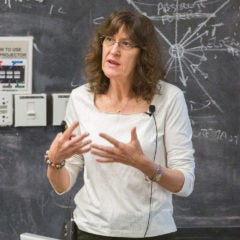
Cecilia E. Gerber is a Professor of Physics at the University of Illinois – Chicago. Her research is centered in the experimental study of hadron collisions at the highest energies available. Her work involves the development of semiconductor detectors that precisely track the passage of charged particles and the elucidation of the characteristics of the production processes of top quarks and searches for new physics that decay preferentially to top quarks. Prof. Gerber has published more than 1000 papers in leading scientific journals and has advised a total of 13 graduate students and 12 undergraduate students. She is an elected fellow of the American Physical Society, elected fellow of the American Association of the Advancement of Sciences, University of Illinois Scholar, Fellow of the UIC Honors College, and UIC 2011 Researcher of the Year. Prof. Gerber received her PhD in Physics from the University of Buenos Aires (Argentina) in 1995, and was a research associate at Fermilab prior to joining the faculty at UIC in 2000. She is married to Daniel Elvira, a senior scientist at Fermilab, and they have two children.
Dr. Nikos Varelas varelas@uic.edu (312) 996-3415 2134 SES Heading link
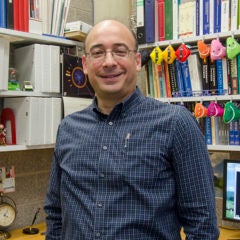
Professor Varelas’ research interests center on precision studies of Quantum Chromodynamics (QCD) and on searches for the Higgs Boson at hadron colliders. He is a member of the D-Zero experiment at the Tevatron Collider at Fermi National Accelerator Laboratory in Batavia, Illinois, and of the CMS experiment at the Large Hadron Collider at CERN in Geneva, Switzerland. His technical contributions to D-Zero center on the Trigger System. He served as Trigger Coordinator for the D-Zero experiment, Co-Project Manager of the Trigger Upgrade for the Run II, and Chair of the Trigger Board. He has also served as co-convener of the Higgs Physics Group in Run II and co-convener of the QCD Physics Group in Run I. At CMS he has served as co-convener of the Jets and Missing-ET Physics Object Group and currently serving as co-convener of the QCD Physics Group. Professor Varelas is also a member of the Coordinated Theoretical-Experimental Project on QCD (CTEQ) Collaboration.
Dr. Richard Cavanaugh cavana@uic.edu (312) 996-3400 2268 SES Heading link
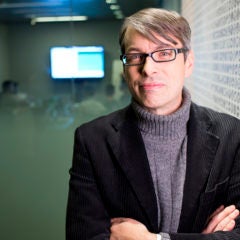
Professor Cavanaugh specializes in Particle Physics and holds a joint appointment with Fermilab. His current research interests include searching for new fundamental symmetries in nature and possible extra dimensions of space, which may probe the origin of dark matter in the universe. He received his Ph.D. in 1999 from The Florida State University using the ALEPH experiment at the Large Electron-Positron Collider at the European Organization for Nuclear Research (CERN) in Geneva, Switzerland. Continuing his work on ALEPH, he subsequently accepted a post-doctoral appointment at the Universitaet Heidelberg in Germany. In 2001 he joined the research faculty at the University of Florida. There he worked on the Compact Muon Solenoid (CMS) experiment at the CERN Large Hadron Collider, and he coordinated several national initiatives in high performance Grid computing. Before joining UIC and Fermilab, Professor Cavanaugh spent time at the Ecole Polytechnique in Paris as a visiting scientist, investigating Supersymmetry in the context of precision experimental data.
Dr. Corrinne Mills cmills10@uic.edu (312) 996-4569 2272 SES Heading link
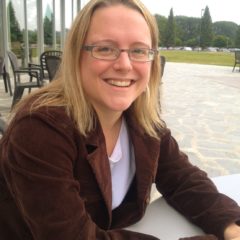
Corrinne Mills is an Assistant Professor at UIC with a joint appointment to the Fermi National Accelerator Laboratory. Professor Mills is a member of the CMS collaboration and holds a joint appointment with Fermilab. Her current research interests are measurements of the recently observed Higgs boson, and the connections between the physics of Higgs bosons and the fundamental questions that the Standard Model of particle physics, for all its successes, cannot answer. How did the matter in our universe arise from a matter-antimatter-symmetric initial state? What is the nature of dark matter, for which there is strong observational evidence but which cannot be any known fundamental particle? Can we see evidence of new particles and interactions even beyond the kinematic reach of the LHC through their influence on observable processes? Study of the observed Higgs boson and searches for additional Higgs bosons may hold the key.
The High-Luminosity LHC, scheduled to begin operations in 2026, will let us confront these questions with an unprecedented dataset, nearly 100 times what has been collected to-date. The full potential of this dataset can only be realized with detectors upgraded to handle the corresponding increase in proton-proton interaction rates. To this end, Professor Mills is working on the replacement of the forward pixel detector that will provide precision particle tracking and vertexing in the busy HL-LHC conditions. Most recently her team is studying the performance of prototype sensor+readout assemblies at the Fermilab test beam and an X-ray facility at UIC.
Dr. Mark Adams adams@uic.edu (312) 996-3403 2274 SES Heading link
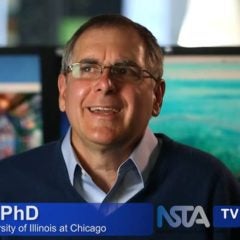
Dr. Mark Adams is an Emeritus Professor at the UIC Physics Department who received his B.A. in Physics from the University of Maryland and his Masters, PhD and PostDocs from SUNY Stony Brook. For over 20 years, Adams used leptons as probes of structure, from production of low mass lepton pairs to observation of leptons with the highest transverse momenta available. Physics interests have included: the production of low mass electrons; high resolution studies of upsilon decays; deep-inelastic muon scattering at low xBj ; searches for anomalous trilinear boson couplings; lepto- quark searches; top quark production; and searches for Standard Model Higgs boson, fermiphobic Higgs boson, and massive exotic boson decaying to top-quark pairs.
Dr. Adams has a strong commitment to outreach, bringing cosmic ray experiments to high schools via our UIC QuarkNet program and the Chicago Large Air Shower Array (CLASA). Adams is currently serving as a member of the QuarkNet Advisory Board.